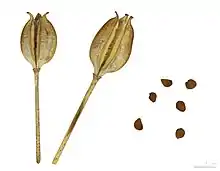Tulipa sylvestris
Tulipa sylvestris, the wild tulip[3] or woodland tulip,[4] is a Eurasian and North African species of wild tulip, a plant in the lily family. Its native range extends from Portugal and Morocco to western China, covering most of the Mediterranean and Black Sea Basins, and Central Asia. The species is also cultivated as an ornamental and naturalized in central and northern Europe as well as a few scattered locations in North America.[2][5] It was first recorded as being naturalised in Britain in the late 17th century.[6]
| Tulipa sylvestris | |
|---|---|
 | |
| 1885 illustration[1] | |
| Scientific classification | |
| Kingdom: | Plantae |
| Clade: | Tracheophytes |
| Clade: | Angiosperms |
| Clade: | Monocots |
| Order: | Liliales |
| Family: | Liliaceae |
| Subfamily: | Lilioideae |
| Tribe: | Lilieae |
| Genus: | Tulipa |
| Subgenus: | Tulipa subg. Eriostemones |
| Species: | T. sylvestris |
| Binomial name | |
| Tulipa sylvestris | |
| Synonyms[2] | |
|
Synonymy
| |

Description
It is a bulb-forming perennial, with narrow blue-grey leaves and usually with 1 or 2 flowers per stem.[6] The stem can reach up to 50cm tall. The scented blooms appear between April and May,[6] and the yellow flowers are sometimes tinged red on the outside.[7][8][9][10]
They rarely produce seed and are pollinated by small insects.[6]
- Subspecies[2]
- Tulipa sylvestris subsp. australis (Link) Pamp - from Portugal + Morocco to Xinjiang
- Tulipa sylvestris subsp. primulina (Baker) Maire & Weiller - Algeria, Morocco
- Tulipa sylvestris subsp. sylvestris - Italy, Libya
Tulipa australis is also found on the island of Malta, in the Mediterranean Sea, limited to one specific area.[11]
Habitat
It is found in dry grassy places and in woodland copses.[6]
References
- illustration from Prof. Dr. Otto Wilhelm Thomé Flora von Deutschland, Österreich und der Schweiz 1885, Gera, Germany
- "World Checklist of Selected Plant Families: Royal Botanic Gardens, Kew". apps.kew.org. Retrieved 2015-05-02.
- USDA, NRCS (n.d.). "Tulipa sylvestris". The PLANTS Database (plants.usda.gov). Greensboro, North Carolina: National Plant Data Team. Retrieved 12 December 2015.
- "Perennial Meadows, Design & Plant, Tulipa sylvestris – the woodland tulip". perennialmeadows.com. 16 May 2013. Retrieved 2015-05-02.
- "Plants Profile for Tulipa sylvestris (wild tulip) | United States Department of Agriculture plants profile". plants.usda.gov. Retrieved 2015-05-02.
- Spencer-Jones, Rae; Cuttle, Sarah (2005). Wild Flowers of Britain and Ireland. London: Kyle Cathie Limited. p. 80. ISBN 9781856265034.
- "Altervista Flora Italiana, Tulipano selvatico, Tulipa australis Link". luirig.altervista.org. Retrieved 2015-05-02.
- "Biota of North America Program 2014 county distribution map". bonap.net. Retrieved 2015-05-02.
- Everett, D. (2013). The genus Tulipa Tulips of the world: 1-380. Kew publishing, Kew.
- Christenhusz, M.J.M., Govaerts, R., David, J.C., Hall, T., Borland, K., Roberts, P.S., Tuomisto, A., Buerki, S., Chase, M.W. & Fay, M.F. (2013). Tiptoe through the tulips - cultural history, molecular phylogenetics and classification of Tulipa (Liliaceae). Botanical Journal of the Linnean Society 172: 280-328.
- Schembri, Patrick J.; Baldacchino, Alfred E. (2011). Ilma, Blat u Hajja: Is-Sisien tal-Ambjent Naturali Malti (in Maltese). p. 81. ISBN 978-99909-44-48-8.
External links
- Plants For a Future, Tulipa sylvestris - L.
- Dave's Garden Plantfiles, Florentine Tulip, Wild Tulip Tulipa sylvestris
- Pacific Bulb Society, Tulipa Species Four photos of several species
- Care For Tulips Plant
- Great Plant Picks